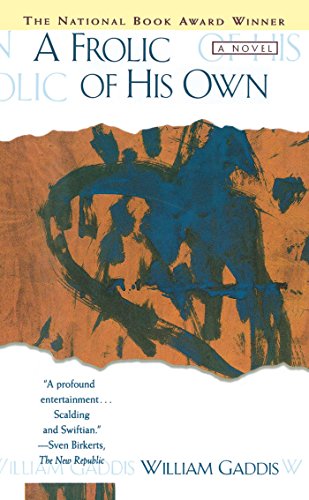What do you think?
Rate this book


514 pages, Kindle Edition
First published January 1, 1994
W Gaddis
Defendant
05 October 2013
Claimant
Defendant
—Well it’s late enough Oscar, I brought out some sturgeon, maybe we’ll just want lunch? But he’d already ordered up tortellini for lunch, told that woman to fix it in some broth and then something in an Alfredo sauce and salad if anyone could find her, bad enough just trying to find anything herself, scissors, any scissors, those ginger preserves, his copy of Fitzhugh’s Cannibals All! because he certainly couldn’t scale the shelves in the library the mess it was in since they’d moved things around to put a bed in there for him where he couldn’t reach the phone that had already ring twice since he’d been left sitting here in the rain, abandoned was really the word for it, he’d had her look in his room upstairs for his play in a black pebbled binder and she finally came down with an old address book and the papers, had they brought out the newspapers? Not that he could read them if they had because that was the worst of it, his glasses, —what that woman could have done with my glasses I haven’t been able to read anything but the headlines since the day before the, the mail even the mail, wherever she’s hidden the mail like every illiterate in this whole illiterate country I have to watch the news trimmed to fit that damned little screen between the hemorrhoid and false teeth commercials, can you imagine what the rest of the audience looks like? America has taken Spot to its heart, did you see it last night? Every idiot in sight down there with something to sell, dog candy, hot dogs, Free Spot! buttons, Free Spot! T shirts, Spot dolls with huge wet eyes and that whole hideous Cyclone Seven? peddling this take apart puzzle model and a game where you try to get the dog out with magnets shaped like a dog bone? Marching around for animal rights, artists’ rights, black rights, right to life, abortion, gun control, Jesus loves and the flags, Stars and Stripes, Stars and Bars and then somebody . . .The plot concerns Oscar, a self-absorbed and reclusive history professor living in the family mansion in the Hamptons, who is suing the producers of a major Civil War movie he claims have stolen a play he wrote decades earlier. That play, quoted extensively in the book, is ponderous and Socratic - parts of Plato's dialogues are quoted almost verbatim - and bears a passing resemblance to Eugene O'Neill's Mourning Becomes Electra (and eventually O'Neill's estate ends up suing Oscar). Oscar is frequently visited by his gold-digging hick girlfriend Lily, sister Christine and her husband Harry (a lawyer who comes closest to the Stephen Dedalus-like Otto of The Recognitions: learned, cynical, with literary leanings). As the reader must guess who is talking, each has a distinct style, but all Gaddis characters speak in a frantic, self-interrupting, torrent. Thus between other experimental flourishes, like long passages of drama, legal rulings, or news articles, the book reads most like the fast, witty plays of Noel Coward or David Mamet (or more classically, Sheridan's School for Scandal, which appears peripherally in the novel). Lawsuits multiply (Oscar is also suing the manufacturer of his car, since he accidentally ran himself over trying to start it; Christina's friend is suing the father of her aborted foetus to maintain her right to abort it, while suing a hospital for foetal endangerment; and a dog trapped in a metal sculpture in Greenwich Village creates a ping-pong of suits and countersuits...). If there is a theme it might lie in Oliver Wendell Holmes Jr., whose Civil War experiences made him a moral and philosophical skeptic, and led to the watershed of legal realism, something Oscar's grandfather, a colleague of Holmes', fiercely opposed. By 1994 (when the novel takes place) it is clear Holmes has won - as the book opens
Justice? – You get justice in the next world, in this world you have the lawOverall it is a chaotic, mandarin satire of the inane wasteland of American culture; learned, entertaining and fiercely misanthropic.